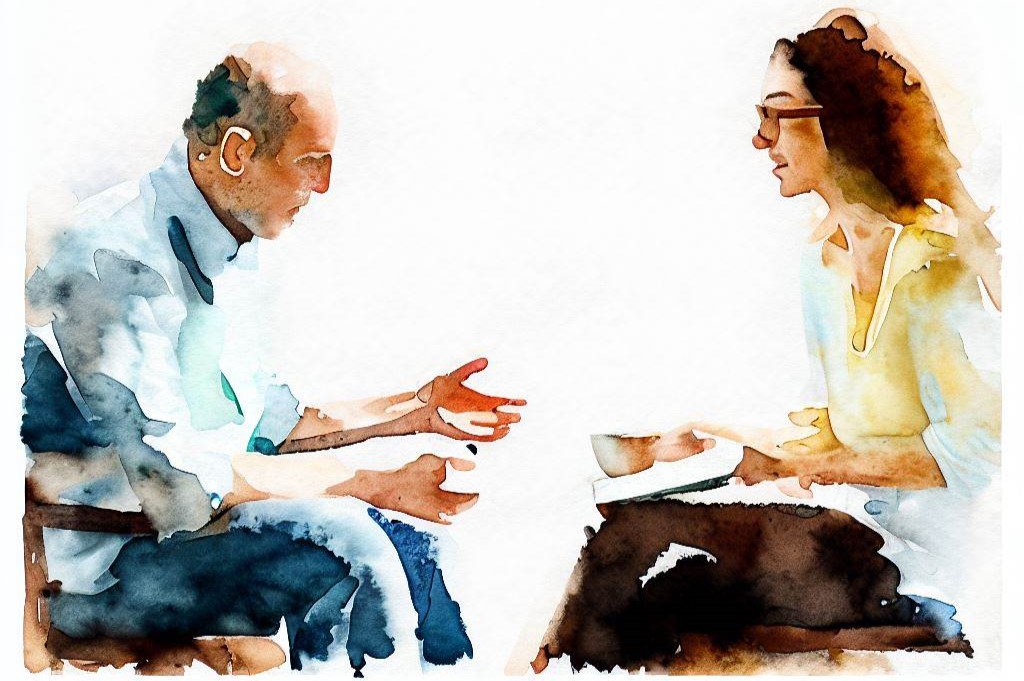Ever been in a situation where someone just talks about themselves and it just never seems to end? So you sit there zoning out where every attempt to slither in a sentence is interrupted by more words that are now falling on deaf ears.
They don’t ask you any questions or show any interest in your life. The conversation gets really stale very quickly, and you find yourself politely bowing out of the conversation because you just can’t take it anymore. Don’t you hate that? But if it tells you anything, it’s that people sure love to talk about themselves.
So how can you hijack this deep longing for importance to work in your favor? How do you make people feel important, which in turn helps you come across as an amazing communicator, and allows you to establish friendships very quickly? Let me introduce you to the conversational spotlight: an essential technique to become an incredible people person.
What is the conversational spotlight?

The conversational spotlight is a metaphor for letting other people be the point of focus during a conversation. Like they’ve got a spotlight on them, you’re letting them do the performance, and baring witness.
In simpler terms, the conversational spotlight technique is to let people speak their minds undisrupted, and giving them your full undivided attention – which makes them feel acknowledged.
Most of us are conditioned to listen with our mouths. We blabber on and attempt to soak up as much recognition as we can, because we crave that validation. That recognition makes us feel all warm and tingly like we’re actually important. But so often, we need to compete for that attention.
So when you really start hearing people out, it becomes obvious just how starved for attention everyone is. This is your golden ticket to show people that you actually want to listen to their story. When people see that you aren’t just listening to them to be polite, but you actually want to hear what they have to say, it’s a game changer for your social relationships.
Why active listening makes you a better conversationalist
Learning the conversational spotlight technique is really important if you want to master your social skills, because the best conversationalists also tend to be great listeners.
A good conversationalist seldom speaks about themself, unless asked. To be a good conversationalist, you don’t need to be super interesting or tell the most captivating stories. Being a good conversationalist is about being present with the person you’re speaking with, and showing interest in their life.
Great conversationalists are experts at holding space, and making other people feel heard. They don’t need to compete for the spotlight or feel the need to validate themselves. They give their energy to others, and people return that with respect.
Everyone wants to feel important
Feeling important is one of the biggest needs we have, and people tend to forget about others in an attempt to validate themselves. But how often do people actually allow someone to fulfill this desire, without jumping in and competing for the spotlight? It doesn’t happen very much.
Therefore, if you use the conversational spotlight technique with the people you’re interested in talking to, it acts as a really powerful tool to provide the validation that people crave. The best part about this technique is that you don’t really need to do anything, besides listen and be attentive.
In saying that, the conversational spotlight is also a highway to building rapport with someone. It cultivates deeper friendships because people feel like you actually care about them, which doesn’t happen much in the fast-paced, self-centered society we find ourselves straggling around in.
How does the conversational spotlight help you become a better communicator?

Many people feel frustrated with their social interactions because other people don’t take the time to listen to them. I’ve been there many times, I bet you have too. You really want to talk about something interesting in your life, but it seems unwarranted, and nobody really cares.
So when you take the initiative to let other people talk about themselves, it’s absolutely a refreshing change. When you feel unacknowledged in your social interactions, it feels like people make the formalities, but it’s just to be polite. A deeper layer to the interaction is absent.
You feel like you’re second best to the person, and this doesn’t set a good impression on the person you’re talking to. So you end up politely bowing out of the conversation and moving on to something that feels more wholesome.
People aren’t necessarily trying to be rude or come off as unwelcoming. They are often just caught in their own need to seek approval, and this is validated by them talking about themselves.
Think about times when this happens to you, how do you feel? Think about times when other people have listened to you completely, without judging you or trying to rush you. There’s probably a big difference in how fulfilled you were, and what the interaction meant to you personally.
So as a good conversationalist who is looking for deeper, fulfilling connections, it’s your responsibility to break people out of this loop. The only way to do that is to stop competing and to give them your full attention.
The conversational spotlight helps to establish trust
By giving the conversational spotlight, people think ‘Oh wow, this person actually cares about what I’m saying.’ In turn, they care about you more. This leads to more trust and a sense of camaraderie between the two of you.
You’ll find that people tend to open up to you more when you listen to them. They often end up telling you more than they tend to tell most people they meet because you cultivate trust. Cultivating trust is an essential pillar in establishing a good, solid connection with someone, and will really help you get to know the person better.
People respect you more
When you show interest in someone’s life, it actually earns you a lot of respect. The reason for this is because people open up to you. When you acknowledge them as human beings, you gain a more three-dimensional window into who they really are. This creates authenticity. People respect authenticity because so many people are faking it.
If someone listens to you unconditionally while you tell them about your life story, you’re probably going to respect them a lot more for doing so too. So of course, it works the other way around.
You learn a lot from other people
Just by really listening to people, you’re going to learn a whole lot. You’d be surprised how much you learn just from people telling you about their stories, the things they have learned, and about their own life experiences.
People are goldmines of knowledge, wisdom, and valuable information. If you’re into personal development and constantly working on yourself, there’s no better source of wisdom than to speak with people and listen to what they have to say. By giving people the conversational spotlight, it actually really benefits you too.
How to use the conversational spotlight effectively

So now you know what the conversational spotlight is and why it’s so beneficial. Here we’re going to talk about how you can use the conversational spotlight technique efficiently so that your conversations develop a whole new level of depth.
Ask open-ended questions
One way to effectively use the conversational spotlight is to ask open-ended questions. You want to open the person up and get them talking. Often, you need to get the motor going. They’re not just going to open up to you immediately because they’re going to assume you’re like most other people who aren’t interested in their story.
That’s why you need to show them that you’re actually going to listen to them – by asking questions about their life. These types of questions encourage the other person to share more about their thoughts and feelings, rather than just giving a simple yes or no answer.
Instead of asking ‘Do you like to travel‘, ask something with a little more depth such as ‘Why do you like to travel?‘ Really pry the person open to access the juicy information inside. Once they see that you’re actually curious about them and want to know more, they’re more than likely to take it from there.
If you’re not sure what to ask or how to do it in a smooth way, read the article below.
Become a master at holding space
To really use the conversational spotlight well, you need to become good at holding space. Holding space means that you set the tone for the interaction, and become a stable presence for someone to express themselves to.
This means you don’t combat, or get triggered, or emotional, but you provide a safe, comforting atmosphere for someone to open up to you. Essentially, you just need to be a pillar that the person feels safe around and witness them while they express whatever they need to.
Don’t jump in, interject or interrupt. Don’t story top or try to prove yourself. Remain silent while they’re talking, and let them get everything off their mind, then talk afterward.
- The art of holding space for others: An important tool for any aspiring healer
- How to Effectively Hold Space for Someone | The Best Healing Practices Come From Doing ‘Nothing’
Validate the people you’re talking with
Validate the person you’re talking with by acknowledging what they say and responding to things. If they tell you that they’ve been going through some stuff, show compassion and understanding. Tell them that you understand, and relate to them.
If they have a wild story, show your amazement and make them feel like they’re telling someone who is really interested. Say things like…
‘Oh wow, I can’t believe you did that‘, or ‘I’m sorry you went through that, you must be a strong person‘. Otherwise, when they’re speaking, nod your head regularly and visibly show them that you’re following.
Of course, you don’t want to fake it, but practice the skill of social calibration to get on their wavelength, and don’t forget to validate what they’re saying. Below is a resource to help you connect with the person you’re speaking with at a deeper, and more congruent level.
Give your complete undivided attention
To be good with people, you must understand that people have to feel good around you. People associate the feelings that they have around you, with you. So be present with the person, and don’t think about other things.
There is no better way for someone to feel comfortable with you, than to listen to them, and give them your undivided attention. Be there with them completely and remember that it’s not about you, it’s about them.
Be an active listener
To be an avid listener, you must remain engaged in the conversation. Acknowledge and process everything the other person says. Don’t tune out and have their words fall on deaf ears.
Respond to their comments, questions, and remarks. Offer advice if necessary. Relate your own stories and life experiences, but don’t take the spotlight.
Start practicing active listening with every opportunity you get, then watch how easy it is to build people’s trust and comfort with you.

